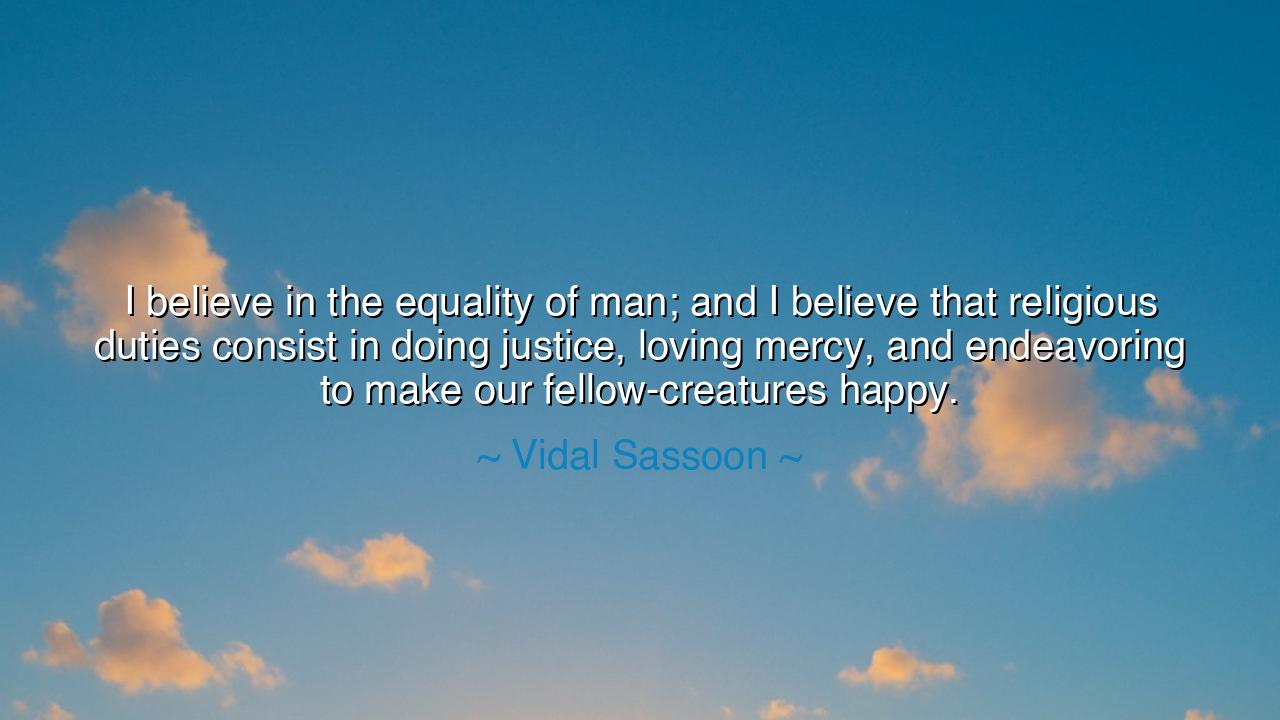
I believe in the equality of man; and I believe that religious
I believe in the equality of man; and I believe that religious duties consist in doing justice, loving mercy, and endeavoring to make our fellow-creatures happy.






In the noble words of Vidal Sassoon, spoken not as a philosopher but as a man who shaped beauty and believed in the betterment of humankind: “I believe in the equality of man; and I believe that religious duties consist in doing justice, loving mercy, and endeavoring to make our fellow-creatures happy.” Though simple in its phrasing, this declaration is profound in its truth. It does not speak only of faith or creed, but of the sacred responsibility of being human. Sassoon’s creed is not confined to temples or scriptures; it is a living faith—a faith of action, compassion, and equality.
In these words, we hear the echo of an older wisdom, one that transcends borders and centuries. For what Sassoon declares is not new—it is the eternal law written upon the human heart. The equality of man is not a gift to be granted by kings or governments; it is an inheritance from the Creator, the divine breath that animates all beings alike. And yet, throughout history, this truth has been obscured by pride, greed, and division. Sassoon’s voice rises against that darkness, reminding us that religion, at its core, is not ceremony or dogma, but justice and mercy made visible through deeds.
Born in poverty, Sassoon rose not only to become a legend in the world of style, but a servant of humanity. He knew hardship, and from it he learned empathy. Having lived through war and seen suffering, he used his success not as a throne, but as a bridge—to help, to heal, to give. His belief that “religious duties consist in doing justice, loving mercy, and endeavoring to make our fellow-creatures happy” was no idle sentiment; it was the guiding light of his life. In this, his faith was not bound by any single religion but reflected the shared essence of all: that goodness toward others is the highest form of worship.
Consider the story of William Wilberforce, the English reformer who fought for the abolition of slavery. A man of deep faith, he too believed that the true test of religion was not in words but in works. For decades he faced ridicule, resistance, and exhaustion, yet he pressed on until slavery was abolished throughout the British Empire. His life embodied what Sassoon spoke: justice, mercy, and happiness for others are the true acts of holiness. When Wilberforce freed others, he freed his own soul; when Sassoon uplifted others, he sanctified his own existence. In both men, we see that righteousness is not built in sanctuaries—it is built in service.
To do justice is to act rightly, even when the world turns away. It is to see the poor as your kin, the oppressed as your duty, the stranger as your neighbor. To love mercy is to forgive where you could condemn, to lift where you could ignore, to heal where you could wound. And to make our fellow-creatures happy—that is to recognize that joy shared multiplies, that a smile offered to another is a prayer answered in heaven. These are not small things; they are the pillars upon which civilization stands. Without them, power is tyranny, and religion is hollow.
Sassoon’s words also awaken us to the idea that faith without compassion is but a shadow of truth. In an age where people divide over doctrine and belief, he calls us back to the essence—to live kindly, to serve humbly, to love greatly. The divine does not dwell only in the temple or the text, but in the acts of those who ease another’s pain. Every hand that helps, every heart that forgives, every life that brings joy to another becomes a living sanctuary of goodness.
Let this teaching, then, be carved upon your heart: Equality is the first law of creation, and kindness is the first duty of faith. No matter your religion, no matter your rank or race, the call is the same—to do justice, to love mercy, and to bring happiness where sorrow reigns. Begin where you stand: help one who stumbles, forgive one who wrongs you, speak for one who cannot speak. These are not small offerings—they are sacred acts that sustain the world.
And remember, as Sassoon knew, that the truest beauty is not in the shape of a haircut or the shine of gold, but in the soul that serves others selflessly. To live by his creed is to become an instrument of harmony in a discordant age, a light in the dim corridors of indifference. For in the end, religion fades, titles crumble, and riches turn to dust—but justice, mercy, and joy in service endure forever.






AAdministratorAdministrator
Welcome, honored guests. Please leave a comment, we will respond soon